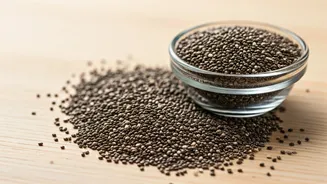Digestive Issues Exist
One of the primary groups advised to be wary of chia seeds are those experiencing digestive difficulties. The high fiber content, while beneficial for
most, can exacerbate issues like bloating, gas, and abdominal discomfort in individuals already dealing with irritable bowel syndrome (IBS) or other digestive problems. The sudden influx of fiber from chia seeds can overwhelm the digestive system, leading to these unpleasant symptoms. Those prone to constipation may experience a worsening of their condition due to the seeds' tendency to absorb water, potentially leading to hard stools. Therefore, if you have pre-existing digestive problems, it's wise to introduce chia seeds gradually, or consult with a healthcare professional before including them in your diet, ensuring that your gut can comfortably handle the increased fiber intake and maintain digestive ease.
Blood-Thinning Medication Risks
Individuals taking blood-thinning medications, such as warfarin or aspirin, should exercise caution with chia seeds. Chia seeds possess properties that can thin the blood, which, when combined with these medications, may increase the risk of excessive bleeding. This effect is due to the omega-3 fatty acids found in chia seeds, which can interfere with blood clotting. Therefore, those on blood thinners must be particularly mindful and consult their doctor before integrating chia seeds into their diet. The combination could potentially lead to serious health complications, making it crucial to monitor blood clotting and adjust medication dosages as necessary under medical guidance. Prioritizing safety through informed decisions is essential when it comes to dietary choices and medication interactions, helping to avoid any adverse health impacts.
Risk for Swallowing Issues
Chia seeds' ability to absorb water, expanding significantly in size, creates a potential hazard for those with swallowing difficulties or dysphagia. This characteristic means that if not consumed properly, the seeds can pose a choking hazard. This is especially true for individuals with conditions that impair their ability to swallow safely. In these cases, the seeds can expand in the esophagus, leading to obstruction or discomfort. It is crucial for those with swallowing problems to either avoid chia seeds or consume them only after being thoroughly soaked in liquid, allowing them to expand before ingestion. Ensuring proper preparation can mitigate the risk, but medical supervision might be necessary, ensuring a safe and manageable consumption that does not compromise their respiratory or digestive health.
Allergies and Reactions
Although rare, chia seed allergies do exist, presenting a significant risk for those affected. Allergic reactions can range from mild symptoms, like skin rashes and hives, to severe conditions such as anaphylaxis, which can be life-threatening. Individuals with known seed allergies or a history of allergic reactions should introduce chia seeds very cautiously, starting with a minimal amount and closely monitoring for any adverse reactions. The symptoms might include itching, swelling, difficulty breathing, or gastrointestinal distress. Immediate medical attention is vital if severe reactions occur. Careful monitoring and consulting with an allergist or healthcare provider are essential for anyone who suspects they might be allergic to chia seeds, ensuring the safe integration of chia seeds or avoidance in their diet.
Before Upcoming Surgeries
Patients scheduled for surgery should often avoid chia seeds for a period leading up to their procedure. Chia seeds' blood-thinning properties can increase the risk of bleeding during and after surgery. It is typically recommended to stop consuming chia seeds several weeks before any surgical procedure to minimize this risk. This precautionary measure allows the blood to return to its normal clotting ability, promoting safer surgical outcomes and reducing the likelihood of complications. Consulting with your surgeon or medical team about dietary restrictions before surgery is crucial. They can provide specific advice tailored to your medical history and the nature of the upcoming surgery, ensuring that your diet supports optimal health and recovery, and avoids any potential adverse interactions.














